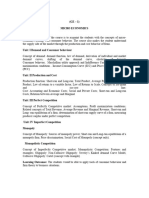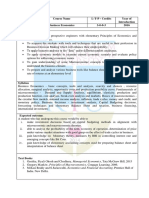B. Tech Sem - I SUBJECT-Engineering Economics and Principles of Management (AM110) Teaching Scheme (Hr/week) Exam Scheme (Marks)
B. Tech Sem - I SUBJECT-Engineering Economics and Principles of Management (AM110) Teaching Scheme (Hr/week) Exam Scheme (Marks)
Uploaded by
jay bhagatCopyright:
Available Formats
B. Tech Sem - I SUBJECT-Engineering Economics and Principles of Management (AM110) Teaching Scheme (Hr/week) Exam Scheme (Marks)
B. Tech Sem - I SUBJECT-Engineering Economics and Principles of Management (AM110) Teaching Scheme (Hr/week) Exam Scheme (Marks)
Uploaded by
jay bhagatOriginal Title
Copyright
Available Formats
Share this document
Did you find this document useful?
Is this content inappropriate?
Copyright:
Available Formats
B. Tech Sem - I SUBJECT-Engineering Economics and Principles of Management (AM110) Teaching Scheme (Hr/week) Exam Scheme (Marks)
B. Tech Sem - I SUBJECT-Engineering Economics and Principles of Management (AM110) Teaching Scheme (Hr/week) Exam Scheme (Marks)
Uploaded by
jay bhagatCopyright:
Available Formats
B.
Tech Sem – I
SUBJECT- Engineering Economics and Principles of Management (AM110)
Teaching Scheme (hr/week) Exam Scheme (Marks)
L T PR TH (3 hrs.) SES PR TW TOTAL
3 --- --- 60 --- --- 40 100
Objective: The need to understand the basics concepts of economics & management are
important for the allocation of scarce resources of economy and proper utilization to generate the
required products and services. Demand analysis and consumer behavior are the factors which
teach about the equilibrium price. Types of markets, product pricing and factor pricing leads to a
better understanding of a particular product or service demanded by the consumers. Production
cost and revenue analysis is important for operation of a profitable business. Monetary & fiscal
policies are important for the understanding of consumption, government expenditure,
investment, exports and imports. It also educates us about the ways in which the government
generates revenue and handles its expenditure for a stable economy.
Learning Outcomes:
After completion of this course students will be able to understand:
1. Students will understand the definitions of economics, micro & macroeconomics, utility,
money, wealth, consumer and producer surplus
2. Students will understand demand, function of demand, elasticity, factors of production,
supply & demand equilibrium
3. Students will understand types of markets, price discrimination, dumping and kinked
demand curve
4. Students will understand production, short & long run production function, cost analysis,
fixed cost, variable cost, revenue, breakeven analysis
5. Students will understand monetary policy, fiscal policy, banking, instruments of
monetary policy, liberalization, globalization, privatization, role of government in policy
making and business cycless
Detailed Syllabus:
Unit 1- Basic concepts and definitions: (4 lectures)
Marshall, Robbins and Samuelson’s definition of economics
Positive and normative economics, micro and macroeconomics
Utility, goods and services
Money and wealth
Consumer and Producer surplus
Unit 2- Demand analysis and consumer behavior: (6 lectures)
Demand function
Law of demand
Elasticity of demand and its types
Price, income and cross-elasticity
Measures of demand elasticity
Factors of production
Advertising elasticity
Law of supply and demand, equilibrium between demand and supply
Unit 3- Markets, product pricing and factor pricing: (9 lectures)
Concepts of perfect competition
Monopoly and monopolistic competition (meaning and characteristics)
Control of monopoly
Price discrimination and dumping
Concept of Duopoly and Oligopoly
Kinked demand curve (price leadership model with reference to oligopoly)
Unit 4- Production cost & revenue analysis: (8 lectures)
Production and production function
Short run & long run production function
Cost analysis
Various concepts of cost
Total fixed cost, total variable cost
Average fixed cost, average variable cost, average cost, marginal cost and opportunity cost
Basic concepts of revenue
Relationship between average revenue and marginal revenue
Breakeven analysis; meaning and explanation
Unit 5- Money: (9 lectures)
Meaning, functions, types, monetary policy
Meaning, objectives, tools, fiscal policy
Meaning, objectives, tools, Banking; meaning, types, functions, central bank- RBI, it’s
function, concepts, Cash reserve ratio, bank rate, repo rate, reverse repo rate, statutory
liquidity ratio, functions of central & commercial banks, inflation, deflation, stagflation,
monetary cycles, new economic policy, liberalization, globalization, privatization, fiscal
policy of the government.
Termwork: (40 marks)
1. Students will be required submit assignment based on topics covered in the syllabus such
as calculation of breakeven point, demand analysis of a product or service, GDP, and
inflation.
Text Books:
1. Ahuja, H. L. Modern economics; S.Chand: New Delhi, 2002
2. Dewett, K. K. Modern economics theory; S Chand: New Delhi, 2006
3. Seth, M. L. Monetary economics; Lakshmi Narain Agarwal: Agra, 2018
Reference Books:
1. Paneerselvam, R. Engineering economics; PHI publication: New Delhi, 2014
2. Robbins, S.; Decenzo, D. A. Fundamentals of management: Essential concepts and
applications; Pearson education: New Jersey, 2015
3. Mankiw, N. G. Economics: Principles of economics; Cengage learning: USA, 2017
4. Williamson, T. R. Introduction to economics; D.C. Health & Company: Chicago, 1923
You might also like
- SYLLABUS Managerial EconomicsDocument4 pagesSYLLABUS Managerial EconomicsSaurabh SinghNo ratings yet
- Commerce SyllabuseconomicDocument7 pagesCommerce Syllabuseconomicbinturayo9No ratings yet
- FT I Manag EcoDocument3 pagesFT I Manag EcoKavyaNo ratings yet
- ME SyllubusDocument3 pagesME SyllubusR16 1859 GOLLA PUJARI SHIRISHANo ratings yet
- New Syllabus EEM 3rd Sem 2130004Document2 pagesNew Syllabus EEM 3rd Sem 2130004ArjunAgharaNo ratings yet
- M.comDocument37 pagesM.comTHE MANAGEMENT CONSORTIUM (TMC) ‘All for knowledge, and knowledge for all’No ratings yet
- Introduction To Economics (EC1002)Document2 pagesIntroduction To Economics (EC1002)Geza bumNo ratings yet
- Unit-1 ECONOMICSDocument61 pagesUnit-1 ECONOMICSMohit SoniNo ratings yet
- Econ 101Document3 pagesEcon 101wuwjpubgNo ratings yet
- Course Syllabus: MBA 135 Managerial Economics 2 Credits Course DescriptionDocument3 pagesCourse Syllabus: MBA 135 Managerial Economics 2 Credits Course DescriptionMathew JoseNo ratings yet
- B Com I (Business - Economics)Document5 pagesB Com I (Business - Economics)Pooja RajputNo ratings yet
- Economics SyllabusDocument14 pagesEconomics SyllabusSumit JhaNo ratings yet
- EconomicsDocument9 pagesEconomicsrtvsahilNo ratings yet
- MBEV1001Document1 pageMBEV1001binaybarik44No ratings yet
- HS200 Business Economics PDFDocument3 pagesHS200 Business Economics PDFsethuNo ratings yet
- Syllabus Applied MicroeconomicsDocument11 pagesSyllabus Applied Microeconomicstramnguyen.31221026352No ratings yet
- Managerial Economics LOLP For PGDM 2013-15 by Pankaj KumarDocument4 pagesManagerial Economics LOLP For PGDM 2013-15 by Pankaj KumarRaja ßalaNo ratings yet
- Eco 501 Economic Theory and ApplicationsDocument5 pagesEco 501 Economic Theory and ApplicationsMuhammad Ijaz ArshadNo ratings yet
- SyllabusDocument2 pagesSyllabusthakkar.family24No ratings yet
- Syllabus of Micro Economics: FOR B.A., LL.B. (HONS.)Document5 pagesSyllabus of Micro Economics: FOR B.A., LL.B. (HONS.)Dakshita DubeyNo ratings yet
- BS ECON Course Outlines Punjab UniversityDocument61 pagesBS ECON Course Outlines Punjab UniversityvaniNo ratings yet
- Syllabus B Com Sem-1-2 Economics (Revised)Document4 pagesSyllabus B Com Sem-1-2 Economics (Revised)saurabhranNo ratings yet
- PG Syllabus Cbcs-Final 2018-21Document38 pagesPG Syllabus Cbcs-Final 2018-21Ravi SDNo ratings yet
- Ma Economics SyllabusDocument36 pagesMa Economics SyllabusParmit KourNo ratings yet
- 5 0 0 FinalDocument213 pages5 0 0 FinalPankaj MehtaNo ratings yet
- Economics HS 1ST YearDocument6 pagesEconomics HS 1ST YearDishani ChakrabortyNo ratings yet
- Business Economics-Sem-II-Study MaterialDocument195 pagesBusiness Economics-Sem-II-Study MaterialSHREY ffNo ratings yet
- MPD143Document2 pagesMPD143zamirNo ratings yet
- Micro EcoDocument2 pagesMicro Ecovivekgarg33.vgNo ratings yet
- Economic Analysis 2012Document5 pagesEconomic Analysis 2012Ali IqbalNo ratings yet
- MA Economics Syllabus Bharathiar University 2013Document14 pagesMA Economics Syllabus Bharathiar University 2013Mia MiatriacNo ratings yet
- Business Economics - Code - 107 (BBA-G.& BBA-B&I) - Sem. I 2Document152 pagesBusiness Economics - Code - 107 (BBA-G.& BBA-B&I) - Sem. I 2ashutoshrahi02100% (1)
- BBM 1st Semester SyllabusDocument18 pagesBBM 1st Semester SyllabusBhuwanNo ratings yet
- Syllabus FOR B.A. (Honours) Economics Under Choice Based Credit SystemDocument24 pagesSyllabus FOR B.A. (Honours) Economics Under Choice Based Credit SystemJaga SwainNo ratings yet
- Course Outline BF110 PDFDocument5 pagesCourse Outline BF110 PDFLillian Lilly LyatitimaNo ratings yet
- Economic Analysis For Business DecisionsDocument6 pagesEconomic Analysis For Business DecisionsG NagarajanNo ratings yet
- MAnagerial Economics - Lesson PlanDocument5 pagesMAnagerial Economics - Lesson Planmukesh040% (1)
- Econ 2106 Principles of MicroeconomicsDocument7 pagesEcon 2106 Principles of MicroeconomicsWalid Asif JanjuaNo ratings yet
- Contact Hours: 48 Credit Hours: 3.0Document3 pagesContact Hours: 48 Credit Hours: 3.0Ibrahim shamatiNo ratings yet
- 02 Cis PDFDocument2 pages02 Cis PDFAnasaziXNo ratings yet
- Economics For Managers MODULE 1Document35 pagesEconomics For Managers MODULE 1SUPRITH SREENo ratings yet
- EconomicsDocument9 pagesEconomicssapta1954No ratings yet
- 30 SyllabusMaster 30Document2 pages30 SyllabusMaster 30cumbasanjayNo ratings yet
- Course PlanDocument3 pagesCourse Planunstopable 7 rodiesNo ratings yet
- Arts Economics MinorDocument13 pagesArts Economics Minorshaik2022imran.aimNo ratings yet
- TM - PGDM - 103 - MeDocument39 pagesTM - PGDM - 103 - Mebitunmou100% (1)
- First Semester: Hidayatullah National Law University, RaipurDocument2 pagesFirst Semester: Hidayatullah National Law University, RaipurAnonymous Yy8etqY8pNo ratings yet
- Course Information 2013-14 EC1002 Introduction To EconomicsDocument2 pagesCourse Information 2013-14 EC1002 Introduction To Economics27031993No ratings yet
- BS ECON Course Outlines Punjab UniversityDocument61 pagesBS ECON Course Outlines Punjab UniversityqasimNo ratings yet
- BBM 1st Semester SyllabusDocument15 pagesBBM 1st Semester SyllabusPaamir ShresthaNo ratings yet
- 02 CisDocument2 pages02 CisMuhammad_Khan_6193No ratings yet
- AP Microeconomics SyllabusDocument4 pagesAP Microeconomics SyllabusMr. PopoNo ratings yet
- Me Bba 1ST SemDocument266 pagesMe Bba 1ST SemFarrah Malik100% (1)
- Economics - SyllabusDocument1 pageEconomics - SyllabusAnuraj KrNo ratings yet
- B.Eco New SyllabusDocument3 pagesB.Eco New SyllabusZeonNo ratings yet
- Nep EcoDocument62 pagesNep EcoBhupesh BagNo ratings yet
- Content StandardDocument3 pagesContent StandardBilly JoeNo ratings yet
- Financial Econometrics: Problems, Models, and MethodsFrom EverandFinancial Econometrics: Problems, Models, and MethodsRating: 4 out of 5 stars4/5 (1)
- Balance of TradeDocument3 pagesBalance of TradeBishnu S. MukherjeeNo ratings yet
- Bretton Wood CaseDocument11 pagesBretton Wood CaseMaham WasimNo ratings yet
- Heckscher-Ohlin's Theory of TradeDocument3 pagesHeckscher-Ohlin's Theory of Traderaj guptaNo ratings yet
- Cárdenas 2000Document361 pagesCárdenas 2000L Laura Bernal HernándezNo ratings yet
- R36 Evaluating Portfolio PerformanceDocument65 pagesR36 Evaluating Portfolio PerformanceRayBrianCasazolaNo ratings yet
- Chapter 2Document10 pagesChapter 2Yasin IsikNo ratings yet
- 2023 A Testing Year Will The Macro Scenario Range Widen or NarrowDocument21 pages2023 A Testing Year Will The Macro Scenario Range Widen or NarrowPham Ba NamNo ratings yet
- Macro CH01 - Circular FlowDocument4 pagesMacro CH01 - Circular Flowvivaan6837No ratings yet
- Istanbul Bilgi University: Introduction To MicroeconomicsDocument22 pagesIstanbul Bilgi University: Introduction To Microeconomicsjehana_bethNo ratings yet
- Introduction To Macroeconomics: IS-LM ModelDocument45 pagesIntroduction To Macroeconomics: IS-LM ModelAlbert Eka SaputraNo ratings yet
- Federal Reserve System-Fiat CurrencyDocument17 pagesFederal Reserve System-Fiat Currencyraj100% (2)
- Case Study On Monetary PolicyDocument4 pagesCase Study On Monetary Policydhandmegha9No ratings yet
- White Paper On IMF Programme 2019-2020 Tehreek-e-Labbaik PakistanDocument155 pagesWhite Paper On IMF Programme 2019-2020 Tehreek-e-Labbaik PakistanAshrafHasanNo ratings yet
- Multiple Deposit Creation by Euro BanksDocument20 pagesMultiple Deposit Creation by Euro BankshrishikeshkrojhaNo ratings yet
- AppEcon Module1Document10 pagesAppEcon Module1Ian Eldrick Dela CruzNo ratings yet
- Checklist Calculation Ib EconomicsDocument2 pagesChecklist Calculation Ib Economicstesde lujo100% (2)
- ICM Practice Questions - Money Markets - 9-5-23Document9 pagesICM Practice Questions - Money Markets - 9-5-23Haris AliNo ratings yet
- Uk Productivity PuzzleDocument4 pagesUk Productivity Puzzleapi-53255207No ratings yet
- Solow ModelDocument74 pagesSolow ModelElenaNo ratings yet
- Problems ProblemsDocument11 pagesProblems ProblemsUmar SulemanNo ratings yet
- Unemplyment KrugmanDocument35 pagesUnemplyment KrugmanSaharnaz MasoudiNo ratings yet
- Asias Journey ProsperityDocument618 pagesAsias Journey ProsperityMai LeNo ratings yet
- Analisis Pendapatan, Pertumbuhan Dan Struktur Ekonomi NasionalDocument12 pagesAnalisis Pendapatan, Pertumbuhan Dan Struktur Ekonomi NasionalAnnisa KhairaniNo ratings yet
- Impact of Economic Policy Uncertainty and Macroeconomic Factors On Stock Market Volatility - Evidence From Islamic IndicesDocument10 pagesImpact of Economic Policy Uncertainty and Macroeconomic Factors On Stock Market Volatility - Evidence From Islamic Indicesisna lisaNo ratings yet
- Functions of MoneyDocument2 pagesFunctions of MoneyVranda RastogiNo ratings yet
- Kendriya Vidyalaya Sangathan Regional Office, Jabalpur RegionDocument37 pagesKendriya Vidyalaya Sangathan Regional Office, Jabalpur RegionSuman KumariNo ratings yet
- European Monetary SystemDocument19 pagesEuropean Monetary Systemhakheemvp4809100% (3)
- Lecture From John K. Galbraith 'Power and The Useful Economist'Document4 pagesLecture From John K. Galbraith 'Power and The Useful Economist'FerranPVNo ratings yet
- BMS Prospectus 2021Document10 pagesBMS Prospectus 2021as734No ratings yet
- Specific Factors and Income Distribution: Eleventh EditionDocument20 pagesSpecific Factors and Income Distribution: Eleventh EditionJonny FalentinoNo ratings yet

























































































